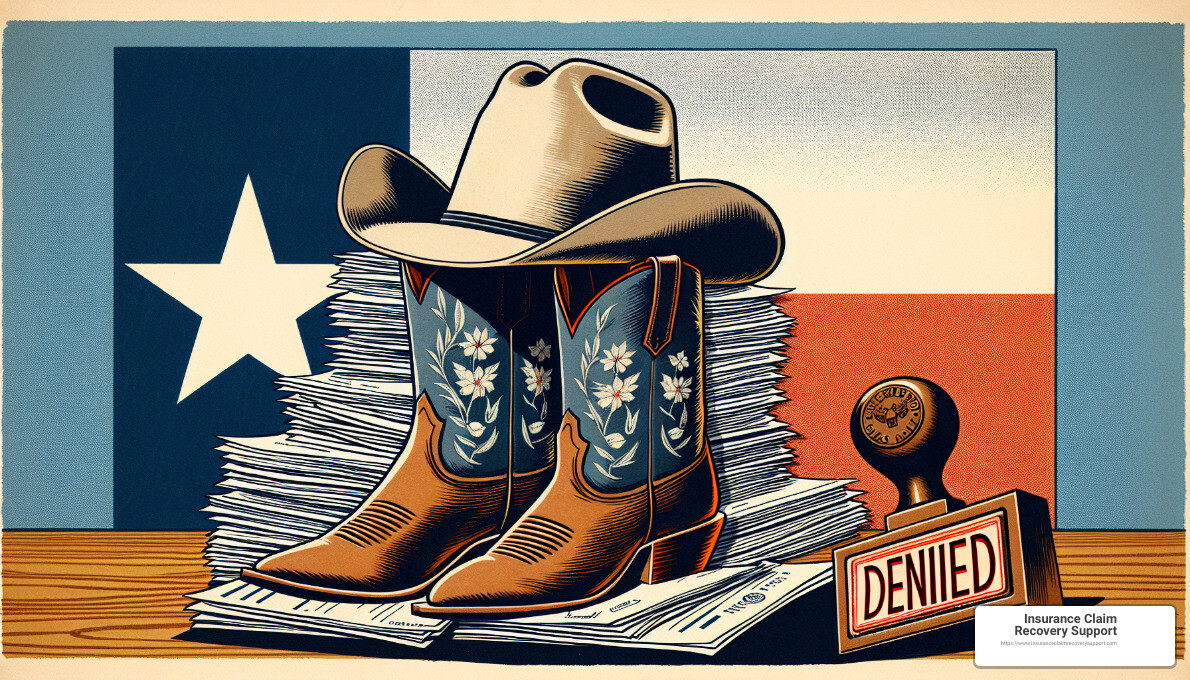When dealing with insurance claims in Texas, understanding Texas bad faith laws is crucial for anyone who feels they’ve been wronged by their insurance provider. Texas bad faith refers to scenarios where insurance companies act unfairly or deceitfully towards policyholders, denying justified claims or delaying payments without a valid reason.
To get straight to the point, here’s what you need to remember about texas bad faith:
- Two Types of Claims: Texas recognizes both common law and statutory bad faith claims.
- What Constitutes Bad Faith: Unreasonable claim denials, delays, and deceptive practices fall under bad faith.
- Legal Protections: The Texas Insurance Code outlines specific insurer responsibilities and prohibited actions.
- Your Response: Policyholders might need legal advice or to contact the Texas Department of Insurance for resolution.
These points are just the tip of the iceberg. In the following sections, we’ll unpack the complex world of texas bad faith, aiming to provide clear, actionable guidance for those navigating this challenging landscape. Whether you’re a commercial building owner, a member of a homeowners association, or an investor in real estate, knowing your rights and obligations can make a significant difference in how you handle insurance disputes.
Keep reading to gain a deeper understanding of texas bad faith and how it might affect your insurance claim strategy.

What is Bad Faith in Texas?
When we talk about bad faith in Texas, we’re diving into a world where insurance companies step out of line. It’s not just about denying a claim; it’s about how and why they do it. Let’s break it down, keeping things simple and clear.
Legal Definition
In Texas, bad faith refers to insurance companies acting unfairly or dishonestly towards their policyholders. Imagine you’ve got a clear-cut claim, but the insurance company says “no” without a good reason, drags its feet, or tries to lowball you. That’s bad faith.
Texas Supreme Court & State Farm v. Simmons
The big guys at the Texas Supreme Court laid down some rules in a case called State Farm v. Simmons. They said, if an insurance company knows it should pay up but doesn’t, that’s bad faith. It’s like knowing you owe your friend lunch money but pretending you forgot your wallet every single time.
Dishonesty & Fraud
At its heart, bad faith is about dishonesty. If an insurance company misleads you about your policy, plays dumb about your claim, or outright lies, that’s hitting bad faith territory. Fraud takes it up a notch, involving intentional deception for gain. Think of it as the insurance company trying to pull a fast one to keep its money in its pocket.
Why It Matters
Understanding bad faith is crucial because it affects your rights as a policyholder. If you’re paying premiums, you deserve fair treatment when it’s time to make a claim. Recognizing bad faith helps you stand up for what’s rightfully yours and ensures insurance companies play by the rules.
So, there you have it: bad faith in Texas is about insurance companies not playing fair, whether through delays, denials, or deception. If you find yourself facing these underhanded tactics, it’s a sign to dig deeper and possibly fight back.
Now that we’ve laid the groundwork on what constitutes bad faith in Texas, let’s move on to explore the different types of bad faith claims you might encounter. Keep reading to arm yourself with knowledge and get ready to stand your ground.
Types of Bad Faith Claims in Texas
In Texas, when an insurance company doesn’t play fair, you’ve got two main ways to call them out: Common Law Bad Faith and Statutory Bad Faith. Let’s break these down so you know exactly what tools you have in your toolbox.
Common Law Bad Faith
Think of Common Law Bad Faith like the unwritten rules of a gentleman’s agreement. These are the principles that have been established over time through court decisions. Here’s the gist:
- Unreasonable Denial or Delay: If an insurance company drags its feet for no good reason or says “no” when it’s pretty clear they should’ve said “yes”, that’s common law bad faith.
- What You Need to Prove: To win this battle, you’ve got to show that the insurance company knew (or really should have known) they were supposed to pay up but chose not to.
It’s like if someone borrowed your bike, promised to return it, but then kept coming up with excuses not to. Not fair, right?
Statutory Bad Faith
Now, for Statutory Bad Faith, think of this as the written rules of the game, specifically laid out in the Texas Insurance Code. This is where things get specific. Texas has two main sections to know about: Chapter 541 and Chapter 542.
- Texas Insurance Code 541: This part talks about the no-no’s, like misleading you about your policy, not investigating your claim properly, or taking too long to make a decision.
- Texas Insurance Code 542: Also known as the Prompt Payment of Claims Act. This one says, “Hey, insurance companies, you’ve got a timeline to follow!” It’s all about making sure they don’t leave you hanging without a valid reason.

Both of these chapters are there to make sure insurance companies keep their promises and treat you right. If they step out of line, these laws are like the referees that can put them back in place.
In Simple Terms:
- Common Law is like the age-old tradition of fairness, based on how things have been done over the years.
- Statutory Bad Faith is the specific set of rules written down to keep insurance companies in check.
Both paths offer ways to hold insurers accountable when they try to play games with your claims. Whether they’re dragging their feet, outright denying your valid claim, or playing hide-and-seek with the details of your policy, you’ve got the law on your side.
If you’re feeling lost or overwhelmed, it’s always a good idea to chat with someone who knows their way around these laws. They can help you figure out which type of bad faith claim fits your situation and how to go about fighting for what’s fair.
Now, armed with this knowledge about the types of bad faith claims in Texas, you’re better prepared to stand your ground and demand fair play from your insurance company. Let’s move on and dive into some real-life examples of bad faith insurance practices, so you know exactly what to watch out for.
Examples of Bad Faith Insurance Practices
When you’re dealing with insurance companies in Texas, knowing the signs of bad faith practices is like having a map in a maze. It can guide you through tricky situations and help you avoid dead ends. Let’s look at some common examples that scream “bad faith” and what they mean for you.
Rejecting Claims Without a Solid Reason
Imagine you’ve filed a claim, and it gets rejected out of the blue. The insurance company doesn’t give you a clear reason, or the explanation seems flimsy. This is a classic sign of bad faith. Insurance companies are obligated to provide a valid reason for denying a claim. If they fail to do so, they’re not playing fair.
Paying You Less Than You Deserve (Underpayment)
Let’s say your claim is approved, but the amount you receive is way less than what’s needed to cover your losses. This underpayment tactic is another red flag. Insurers might hope you’ll accept the lowball offer just to get some immediate relief. But remember, you’re entitled to the full amount that your policy covers.
Misrepresentation
This one’s tricky. Misrepresentation can look like an insurance agent giving you incorrect information about your policy’s coverage or the insurer twisting the language in your policy to avoid paying a claim. It’s like being sold a map to a treasure island, only to find out the map leads to a deserted land.
Delay Tactics
Ever felt like you’re being given the runaround? Delays in handling your claim, repeated requests for the same information, or long periods of silence from your insurer can all be tactics to pressure you into giving up or accepting a lower settlement. It’s a waiting game that insurers play, hoping you’ll blink first.
Intimidation
This is the most direct approach an insurer can take. Threats to cancel your policy, increase your premiums, or take legal action against you if you pursue your claim are all intimidation tactics. It’s like being cornered in that maze with seemingly no way out.
Recognizing these practices is the first step in fighting back. If you encounter any of these situations, it’s a signal to dig deeper. You might feel like you’re up against a giant, but remember, knowledge is your slingshot.
Armed with this understanding, you’re better equipped to navigate the complex landscape of insurance claims in Texas. Keep an eye out for these bad faith practices, and don’t hesitate to seek legal advice if you find yourself facing any of these tactics.
Next, we’ll explore how you can respond to these bad faith practices and the steps you can take to protect your rights and ensure you’re treated fairly.
How to Respond to Bad Faith Practices
When you’re dealing with a situation where you feel your insurance claim isn’t being handled fairly, it might feel like you’re stuck between a rock and a hard place. But don’t worry, there are clear steps you can take to respond to bad faith practices in Texas. Here’s how:
Contacting an Attorney
The first step is often to reach out to an attorney who specializes in insurance law. A good lawyer can be like having a knowledgeable guide in a complicated maze. They understand the ins and outs of Texas bad faith laws and can offer advice tailored to your specific situation. Insurance companies often take claims more seriously when they know you have legal representation.
Internal Review
Before things escalate, it’s worth requesting an internal review of your claim. This means asking the insurance company to take another look at your case, ideally by someone different from the original adjuster. Sometimes, this can lead to a resolution without further conflict.
Texas Department of Insurance
If an internal review doesn’t lead to a fair outcome, your next step is to file a complaint with the Texas Department of Insurance (TDI). This state agency oversees insurance practices and can intervene on your behalf. Filing a complaint is straightforward and can be done online. The TDI will investigate your claim and, if they find evidence of bad faith, can pressure the insurer to settle fairly.
Bad Faith Lawsuit
Apart from your original claim, you might also have grounds for a bad faith lawsuit against the insurance company. This is an additional legal action where you can seek compensation not just for your original losses but also for extra damages caused by the insurer’s bad faith practices. These lawsuits can also include punitive damages, designed to penalize the insurer for their behavior.
Remember, you’re not powerless in the face of bad faith insurance practices. Armed with the right knowledge and support, you can stand up for your rights and seek the compensation you deserve. Whether it’s through contacting an attorney, requesting an internal review, filing a complaint with the TDI, or even taking your claim to court, there are steps you can take to fight back.
With each action, you’re not just seeking justice for yourself but also helping to ensure that insurance companies uphold their obligations to act in good faith. So, if you suspect bad faith, don’t hesitate to take action. Your claim is important, and you deserve to be treated fairly.
Moving forward, let’s dive into the types of damages you might recover in a bad faith lawsuit, giving you a clearer picture of what’s at stake and how you can benefit from standing up for your rights.
Recoverable Damages in Bad Faith Cases
When you’re caught in the whirlwind of a bad faith insurance claim in Texas, knowing the potential damages you can recover is like seeing a lighthouse in a storm. It’s not just about getting back what was wrongfully withheld; it’s about ensuring justice is served. Let’s break down the types of damages you might be entitled to in a bad faith case.
Contract Damages: First up, we have contract damages. This is the money you should have received in the first place. If your claim was valid and the insurance company didn’t pay up, the court could order them to pay what you were originally owed. It’s like the court is saying, “Let’s make this right” by ensuring you get the benefits your policy promised.
Extracontractual Damages: These are the damages beyond what’s covered in your insurance contract. Think of them as the “extra” for the trouble you’ve been put through. If the insurance company’s actions caused you additional financial losses, you could be compensated for these too. It’s the law’s way of acknowledging that the impact of bad faith practices can extend beyond the policy’s limits.
Punitive Damages: Now, this is where it gets interesting. Punitive damages are the court’s way of punishing the insurance company for their particularly nasty behavior. If the insurer acted in a way that was more than just a mistake—if it was egregious—the court might award you punitive damages. This is more about sending a message to the insurer (and others) that bad faith practices won’t be tolerated.
Mental Suffering: Dealing with a bad faith claim isn’t just a financial headache; it can take a toll on your mental health too. The stress, the sleepless nights, the worry—it all adds up. Texas law recognizes this and allows you to recover damages for the mental anguish caused by the insurer’s actions. It’s a recognition that the harm isn’t just to your wallet but to your well-being.
Attorney Fees: Lastly, there’s the matter of attorney fees. Let’s face it, fighting a bad faith insurance claim can be expensive. Thankfully, Texas law allows you to recover the costs of hiring an attorney to take on your case. This means you can seek justice without the fear of drowning in legal bills. It’s like having a legal warrior by your side, paid for by the very company that wronged you.
In summary, if you’re navigating the choppy waters of a bad faith insurance claim in Texas, you’re not just fighting for the money you were initially denied. You’re fighting for a range of damages that acknowledge the full spectrum of harm caused by the insurer’s bad faith actions. From the contract damages to the punitive measures, each type of compensation plays a part in setting things right. And remember, taking action is not just seeking justice for yourself but also helping to ensure that insurance companies uphold their obligations to act in good faith.
Moving forward, let’s explore some frequently asked questions about Texas bad faith laws, to arm you with the knowledge you need to navigate these challenging situations.
Frequently Asked Questions about Texas Bad Faith Laws
Navigating the complexities of Texas bad faith laws can feel like trying to find your way through a maze. To help clear the path, let’s answer some common questions you might have.
What constitutes a bad faith act by an insurance company?
In the simplest terms, a bad faith act happens when an insurance company doesn’t play fair. This could mean they deny a valid claim without a good reason, delay payment on purpose, or don’t tell you everything you need to know about your policy or claim. It’s like if someone promised to help you move, then didn’t show up or pretended they never agreed to it in the first place.
Examples include:
– Saying no to your claim when the facts say they should say yes.
– Taking too long to make a decision on your claim.
– Not being clear about why they denied your claim.
How can I prove my insurance company acted in bad faith?
Proving bad faith can be tricky, but it’s not impossible. Think of it as putting together a puzzle. You need to gather all the pieces (evidence) that show the insurance company didn’t act right. This could be emails, letters, or notes from phone calls where they promised one thing and did another, or where they didn’t give you the information you needed.
Here’s what you can do:
– Keep records of all communications with your insurance company.
– Note any delays and the reasons given for them.
– Get a copy of your insurance policy and highlight any sections relevant to your claim and the insurer’s actions.
What types of damages can I recover in a bad faith insurance claim?
If you’ve been on the wrong end of a bad faith insurance action, Texas law has your back. You can get different types of damages, depending on how the bad faith affected you.
You might recover:
– Policy Benefits: The money the insurance was supposed to pay in the first place.
– Attorneys’ Fees: If you had to get a lawyer to fight your case, you might get back what you paid them.
– Statutory Penalties: Extra fines the law says the insurance company has to pay for acting in bad faith.
– Punitive Damages: Extra money meant to punish the insurance company for what they did wrong.
– Mental Suffering: If the bad faith action caused you stress or anxiety, you might get something for that too.
Every situation is unique, so what you can recover might vary. But the law is designed to make sure you’re not left dealing with the consequences of an insurance company’s bad actions all on your own.
With these FAQs, we hope you feel more equipped to understand and navigate the challenges of Texas bad faith laws. You’re not alone in this journey. There are resources and professionals ready to help guide you through these complex waters and advocate for your rights.
Conclusion
Navigating the stormy waters of Texas bad faith laws can seem daunting. It’s a journey filled with legal intricacies and potential pitfalls. But here’s the good news: you don’t have to embark on this journey alone. Insurance Claim Recovery Support LLC stands as a beacon of hope and support for policyholders facing the challenges of bad faith insurance practices.
Advocating for Policyholders
At the heart of our mission lies a steadfast commitment to advocating for policyholders. We understand the frustration and helplessness that can accompany dealing with insurance companies that act in bad faith. Whether it’s unjustified denial of coverage, underpayment, or delay tactics, our team is equipped to fight for your rights. We believe that every policyholder deserves to be treated fairly and with respect, and we’re here to ensure that happens.
Our approach is simple yet powerful: we listen, we understand, and we act. By truly listening to your story and understanding the specifics of your situation, we tailor our strategy to meet your needs. Our expertise in the Texas insurance landscape allows us to navigate the complexities of bad faith claims effectively, ensuring that your voice is heard and your rights are protected.
Maximizing Settlements
Achieving the maximum possible settlement for your claim is our goal. We leverage our deep understanding of insurance policies and bad faith laws to build a strong case on your behalf. Our team works tirelessly to document and argue for the fullest compensation for your losses, ensuring that you have the resources needed to rebuild and recover.
In the aftermath of Texas storms, the road to recovery can seem overwhelming. But with Insurance Claim Recovery Support by your side, you have more than just a service provider; you have a partner. We’re committed to not just settling claims but to building relationships and providing peace of mind during these stressful times.
For more information on how we can assist you with your insurance claim, visit our loss types service page. Let us be your guide and advocate in securing the settlement you need to move forward.
The journey through Texas bad faith laws is a challenging one, but it’s a journey you don’t have to make alone. With Insurance Claim Recovery Support LLC, you have a dedicated team ready to fight for you every step of the way. Together, we can navigate these challenges and work towards a fair and just resolution.
Disclaimer: Insurance Claim Recovery Support LLC is not a law firm nor giving legal advice. Always speak with a licensed attorney for legal advice. The author assumes no responsibility or liability for any errors or omissions in the content of this site. The information contained in this site is provided on an “as is” basis with no guarantees of completeness, accuracy, usefulness or timeliness










